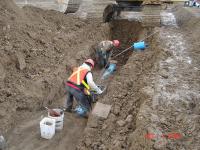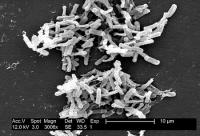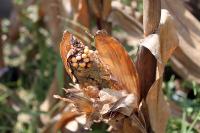-
Flint Water Study research team to present findings on Thursday

Virginia Tech’s Marc Edwards and his team of research scientists and students will give a presentation on Thursday, 28 January, in Blacksburg to outline their work — done in collaboration with Flint, Michigan, residents — which exposed widespread lead-in-water contamination. The presentation will provide an overview of the Flint Water Study team’s efforts combining ethics engineering, citizen science, laboratory experiments, investigative science, and social media to confirm the high lead levels in Flint’s water.
-
-
Piping as poison: the Flint water crisis and America’s toxic infrastructure

As the crisis over the water in Flint, Michigan, rolls on, we’re learning more and more about the irresponsibility and callousness of officials and politicians in charge. The mix of austerity politics, environmental racism, and sheer ineptitude makes for a shocking brew, yet the physical conditions that have made it literally toxic for Flint residents are neither as exceptional nor as recent as much of the media coverage suggests. An estimated three to six million miles of lead pipes across the United States still carry water, and most all of them are vulnerable to similar dangers, whether at the hands of short-sighted and prejudicial bureaucrats or politicians whose ideology or opportunism leads them to blithely dismiss well-established science. The best solution would be to replace our lead lines systematically and proactively, not just one crisis-beset city at a time. Until we do so, it’s a safe bet that more Flints lie on our horizon.
-
-
Brazil “badly losing” battle against Zika virus: Health minister
Marcelo Castro, Brazil’s health minister, said Brazil is “badly losing” the battle against the Aedes aegypti mosquito which spreads the Zika virus. Brazil will deploy nearly 220,000 members of Brazil’s armed forces to go door-to-door as part of the mosquito eradication campaign. The government would distribute mosquito repellent to some 400,000 pregnant women who receive cash-transfer benefits. The authorities in Brazil are worried that the Carnival events, scheduled for next month, and the Olympic Games, due to be held in August, may both serve to cause an even more rapid spread of the virus.
-
-
Most Americans support smart guns: Survey

In 2014, the most recent year for which final data are available, 33,599 people died in the United States from gun violence. The majority were suicides (more than 21,000 deaths), and firearm homicides accounted for more than 11,000 deaths. Unintentional shootings, in which children are often the shooter or the victim, comprised more than 500 deaths that year. Survey finds that nearly 60 percent of Americans, if they buy a new handgun, are willing to purchase a smart or childproof gun — a weapon that is only operable in the hands of an authorized user.
-
-
How dangerous people get their guns
The San Bernardino massacre is unique in several respects, but it does bring into focus an important issue with broad relevance: how do dangerous people obtain guns, and what should the police and courts be doing to make those transactions more difficult? Criminal assaults with guns kill thirty Americans every day, and injure another 170. The guns carried and misused by youths, gang members, and active criminals are more likely than not obtained by transactions that violate federal or state law. Unlike in the case of Enrique Marquez, a friend and neighbor of the terrorist couple who purchased two military-style rifles for them, it is rare for the people who provide these guns to the eventual shooters to face any legal consequences. Currently it is rare for those who provide guns to offenders to face any legal consequences, and changing that situation will require additional resources directed to a proactive enforcement directed at penetrating the social networks of gun offenders.
-
-
Protecting drinking water
We place high demands on the quality of our drinking water. If pathogens or toxic substances found their way into the piping system, many people could become infected or injured very quickly. This is why this risk must be kept low. To do this, experts have developed technologies for a comprehensive monitoring, early warning and emergency management system.
-
-
New plant growth technology may alleviate climate change, food shortage
A research team has developed a new strategy to promote plant growth and seed yield by 38 percent to 57 percent in a model plant Arabidopsis thaliana, hence increasing CO2 absorption from the atmosphere. This technology may also have potential in boosting food production and thus could solve another danger of human civilization: food shortage due to overpopulation.
-
-
Manmade mercury emissions decline 30 percent between 1990 and 2010

Mercury is a metallic element that poses environmental health risks to both wildlife and humans when converted to methylmercury in ecosystems. It can be converted into gaseous emissions during various industrial activities, as well as natural processes like volcanic eruptions. Between 1990 and 2010, global mercury emissions from manmade sources declined 30 percent. New research finds.
-
-
New test for infectious disease promises quick diagnosis

Researchers have come up with a way for inventing molecule probes quickly to identify deadly bacterial strains of infectious disease. The test can be done in less than an hour, compared to the current forty-eight hours, allowing for rapid, more accurate treatment of patients.
-
-
Suicide bomber kills 15 outside polio clinic in Quetta, Pakistan
The Taliban’s violent campaign against bringing Western medicine to children in Pakistan, a campaign which focused primarily on disrupting the efforts of the Pakistani government and international NGOs to fight polio, continues. Earlier today (Wednesday), a suicide bomber has killed at least fifteen people, most of them police, outside a polio eradication center in the city of Quetta in western Pakistan.
-
-
Cheat-proof smartphone knows when you are faking activity

Health care providers and insurance companies are increasingly relying on smartphone and wearable activity trackers to reward active individuals for healthy behavior or to monitor patients. But because activity trackers can be easily deceived, researchers have designed a way to train smartphone trackers to spot the difference between fake and real activity.
-
-
Sharing of research data, findings should be the norm in public health emergencies

Opting in to data sharing should be the default practice during public health emergencies, such as the recent Ebola epidemic, and barriers to sharing data and findings should be removed to ensure those responding to the emergency have the best available evidence at hand, experts say.
-
-
Toxins found in fracking fluids and wastewater: Study

In an analysis of more than 1,000 chemicals in fluids used in and created by hydraulic fracturing (fracking), researchers found that many of the substances have been linked to reproductive and developmental health problems, and the majority had undetermined toxicity due to insufficient information. The researchers say that further exposure and epidemiological studies are urgently needed to evaluate potential threats to human health from chemicals found in fracking fluids and wastewater created by fracking.
-
-
Gov. Brown declares emergency in wake of massive L.A. natural gas leak
California governor Jerry Brown on Wednesday declared an emergency in a Los Angeles neighborhood where a natural gas well has been spewing record amounts of stinking, global-warming methane gas. Energy experts said the breach at the natural gas storage reservoir, and the subsequent, ongoing release, are the largest known occurrence of its kind.
-
-
Drought, heat deleterious for global crops

Drought and extreme heat slashed global cereal harvests between 1964 and 2007 — and the impact of these weather disasters was greatest in North America, Europe, and Australasia. At a time when global warming is projected to produce more extreme weather, a new study provides the most comprehensive look yet at the influence of such events on crop area, yields, and production around the world.
-
More headlines
The long view
A Shining Star in a Contentious Legacy: Could Marty Makary Be the Saving Grace of a Divisive Presidency?
While much of the Trump administration has sparked controversy, the FDA’s consumer-first reforms may be remembered as its brightest legacy. From AI-driven drug reviews to bans on artificial dyes, the FDA’s agenda resonates with the public in ways few Trump-era policies have.
